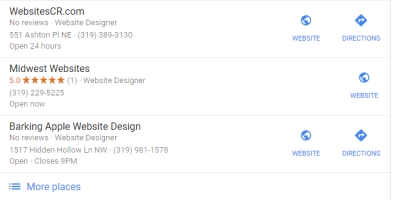A few years ago, I was looking to buy my first home in Cedar Rapids, IA. After a few months of looking at various houses, each with various flaws, I finally found the place I wanted to call home. After asking a multitude of questions, ranging from whether the basement floods to how recently appliances were replaced, I signed approximately a ton of paperwork, closed on the property, and was handed the keys to my house.
Unfortunately, I was misled by the answers to a number of my questions, and the pretty veneer of recently completed work began to peel back, revealing a host of issues. While the discoveries of mold in the upstairs bathroom and rainwater leaking in through my sliding deck door were bad, the poor window molding that brought the bitter cold of an Iowa winter into my office for an entire season took the top placement for nastiest surprise.
That’s what I’d like to say, but the basement was a disaster among disasters, flooding two months after I moved in (despite promises to the contrary). Severe summer storms left me with soaked carpet, standing water, and a lot of damage to property and drywall alike.
Flashing back to my viewing of The Money Pit and being a complete novice to home repair, I quickly came to the conclusion that I needed a contractor. I also knew that I needed to be careful, as some contractors do not enjoy the benefit of an honest reputation. Turning to Google, I began looking for contractors in Cedar Rapids using some common search terms (contractor, drywall, remodeling, etc.).
Open a new tab in your browser, head to Google, and see if you can guess which one I went with. Don’t worry, I’ll be here when you get back.
Among the many results, you may have found Hunter Riley Construction, Done Done Services, or Steger Drywall. All of these possibilities make sense because they are the companies that come up first (depending on your search terms). With the short attention span most people online possess, these companies are also the most likely to receive requests for bids because of their high ranking and/or customer ratings.
Each is a prime example of why having good SEO (Search Engine Optimization) matters so much for your business.
Jump ahead to:
You’ve written a lot about good SEO practices – but do they really matter that much?

That’s a fair question. If your website is your business card, SEO is the charismatic individual handing it out to everyone as they enter the information warehouse that is the Internet. These cards provide precise directions for how to find and contact you so people can learn more about how you will fulfill their needs. Without that individual, your business cards sit in a stack on an end table, occasionally being picked up, but usually being ignored.
While you won’t convert every prospective client who checks your business out online, you will at least convert a percentage if your online website is prominent, designed cleanly, and delivers an appealing message. When prospective clients aren’t seeing your business, you are literally giving money away to your competitors.
Why? Because it is impossible to convert clients who do not know you exist. You begin fixing this problem by investing time and/or money into good SEO. It’s literally that simple.
Okay, but why does it matter to my business?
If you’re asking me this question, you are likely among the many business owners today who still question internet marketing’s place in their long term success. You’re probably relying upon word of mouth, entries in the Yellow Pages, TV and radio commercials, and/or advertisements sent through the mail instead.
Social media. Google My Business. YouTube. Email marketing. These are the evolutions of your antiquated advertising mediums, and are all found online. Each is constantly present in our daily lives, so when I see an older company ignoring them in their advertising strategy, I know I’ll be spelling out an obvious truth in our consultation. Simply put, internet marketing is downright essential for business success today.

Still don’t believe that your ancient tools are a waste of advertising dollars? Many millennials have little to no understanding of concepts like the Yellow Pages, turning instead to the smartphone in their pocket or the laptop in their backpack for the answer to any and every question in their daily lives. This enormous generation of customers will often make or break a company in today’s market by themselves, so you have to know where to connect with them before you can reach them.
While older generations have proven more resistant to these newfangled ideas, a growing percentage are coming around to the notion of embracing them. Those who have not gotten with the times are becoming a minority, and in 10-20 years, will be a very scarce breed. As a result, you need to start reaching out to the online demographic of your market now – its percentage of your clients will only go up in the coming years.
Fortunately, while developing good SEO sounds difficult, there are some easy steps you can take to work toward integrating it as a part of your daily business operations:
- Make SEO a part of your budget
- Secure your content
- Keep your content up to date
- Claim your business listings
- Maintain an active presence on social media
Make a good SEO strategy prominent in your time and advertising budgets
Good SEO takes at least one of two things – time and money. Search engines like Google are constantly evaluating which websites are first page material, so your first step should be to review existing on-site material to ensure good SEO practices are in place. Here’s a checklist of tasks to either do yourself or put in front of an expert like us:
- Check that every page has a customized meta title and description
- Review written content to ensure there are no spelling, grammar, or punctuation errors
- Verify every picture has an alt tag
- Confirm that you have appropriate schema configured for each page
- See if your site has a mobile view for phones and tablets
- Time how long your site takes to load in a private browser window (the further under a second it is, the better)
- Ensure header tags are present and properly placed
Once you’ve gone over your existing content with a fine-tooth comb, your next focus should be on content creation. There are a few different avenues you can take for this stage in developing SEO (YouTube, blogging, etc.), and all are fair game so long as you remember to tie everything to your main website. All new content should also follow the earlier checklist as closely as possible.
While a lot of physical and digital ink has been spilled regarding the rules of good SEO and content creation, most of these nuances boil down to the concepts of your website’s authority and trust. Something as simple as having a blog takes time, but helps establish you as an authoritative source of knowledge in your field. The more your information is referenced online (typically via backlinks on related sites), the more trustworthy your site is considered to be.
Having an editor who can help you keep your content up to date through periodic revisions, a content creator to grow your existing content, and a writer focused on guest posts for other related blogs that include backlinks may take a lot of time and/or money, but sticking with this strategy will bring back an enormous return over the long run. You can choose which currency you’d like to spend, but if you’re as busy as we are, time is a very precious commodity that you cannot get enough of.
Fortunately, you may have more cash to spend on these tasks than you realize.

Frankly, I’m amazed I found a use for them.
We recommend that you begin by reviewing all expenses for your business, and reallocate at least a portion of your nonessential expenses to long-term SEO. If you are still using outdated advertising mediums like the Yellow Pages, make your cuts there first – mine immediately get set in a corner and ignored when they show up at my door.
Commercials and advertisements through the mail can be a little trickier to trim, as some markets still enjoy reasonable success with these tactics. Since this is not the norm, evaluate their effectiveness by asking your customers how they found you over the course of a quarter. Measure how many bring up your advertisements through the mail, on the radio, or on TV as appropriate. Look for trends in how old they are or which areas they live in.
You are likely to find a lower overall response rate than expected, areas that aren’t returning any value, age groups that are ignoring you, or multiple of the above. Should this prove to be true, reallocate any relevant funds to SEO at this point, as you will be able to get a far better return over time.
Securing your content will boost and preserve your SEO
Much as viruses do to computers, websites can fall to the corruption of malicious code called malware. A malware infestation can destroy years of work on a good SEO reputation in a matter of days if you do not have tools to proactively watch for and protect against it – and nearly all sites are or become vulnerable as infection strategies evolve.
The primary exceptions to this rule can be found within most WYSIWYG (What You See Is What You Get) platforms, as they are designed to restrict control and prevent access to server connection methods like FTP and SSH. Unfortunately, it is very difficult (and often impossible) to do as well in search rankings with these restrictions when compared to environments like a server running WordPress, so this isn’t really an adequate solution for protecting against this risk.
As a result, you’ll want to look into options for malware scanners and firewalls. We offer standalone packages for these in our store and inclusion options within our website design packages because we believe in the importance of website security, and too few people are as informed as they should be when it comes to this topic.
Additionally, you should also set up an SSL certificate for your website(s). These are designed to encrypt any data you or your prospective clients might send through your site, such as login credentials to make website changes, credit card numbers, or personal information on a contact form.

Are you going to leave this time and money spent on good SEO unattended or protect it in a guarded vault?
If you among those who think SSL certificates aren’t important to your website’s success, I’d encourage you to reconsider for the sake of your SEO. While Google is traditionally silent about verifying ways to improve your website’s rankings, SSLs are one of the few good SEO practices confirmed to give your website a ranking increase.
This confirmation is also part of their push for “HTTPS everywhere,” an initiative they and a number of other groups have banded together on to promote a safer web browsing experience for everyone. Google doubled down on this in 2018 with an announcement for Chrome 68 that was implemented a few months later. We’ve discussed this topic as well, including the potential implications it holds for the future.
In short – do yourself a favor and ensure your website doesn’t fall behind due to poor security. If you’d like to add one more post to your reading list, you can review our guide for deciding which SSL certificate is right for you.
Keeping your website up to date showcases your relevance
We touched on this a bit earlier, but the importance of keeping your content up to date doesn’t end with your editor. Nor does it end with keeping your WordPress software current. This idea isn’t even limited to your exciting, newly launched product. It’s all of these and more.
A good SEO rule for business owners to live by is that if there is a change or update, your website should be informed first and immediately. New phone number? Update it everywhere it appears on your site. Running a blog? Publish articles on the latest news in your store or industry. Security updates pending in WordPress? Get them tested and applied ASAP.
This not only keeps your customers in the loop, but is also a nod to Google that your business is currently relevant and a positive resource for site visitors and prospective clients. You don’t even have to do this every day – 2-4 times a month is often sufficient, so long as you are consistent.
Claiming your Google business listing is today’s version of being in the phone book
If you haven’t done this for your business yet, I want you to stop reading and go here to start the process. Right now. Come back after you’ve agreed to have Google send you your verification postcard. It’ll take about 5 minutes.
We can’t even begin to stress how important this is on Google’s platform – but we’re going to try anyway. First, and most importantly, a Google My Business listing verifies your company’s legitimacy with Google. You’re showing them that you exist, that you aren’t a fly by night operation trying to scam people, and that you should matter to them.

They stand out quite a bit from regular search results, don’t they? I bet you could pique a lot of interest pretty easily with a listing like this – and if you requested your postcard, you’ve taken the first step toward your own.
Second, you’ve probably noticed that some businesses you search for get a special entry either off to the side or toward the top of the page. These listings often show you more than a regular search engine entry, showcasing contact information, hours, and average customer ratings. This is how you get those big, attention grabbing spaces on Google – especially as you start climbing past your competitors in the rankings.
Third, this gives you a place for customers to leave feedback of their experience with you. After you assist them, make sure you ask them to do so whenever appropriate. These ratings translate well to those of your website and have the added benefit of selling prospective customers who are on the fence about reaching out to you.
Finally, it is a simple way to ensure critical business information is easier for your customers to find. You can also change it at any time, giving you extra incentive to update when needed.
The last item might seem like a small perk, but keeping your business information consistent and up to date is crucial – especially once you factor in third party sites. Platforms like Yelp, YP, Facebook, and MerchantCircle will fill in any old information they come across for their databases – even if it is years out of date!
Taking the time to set up a listing on Google and synchronizing your business details with outdated information from third party sites ensures the information your prospective clients find and use to connect with you is correct. This also counts as another good SEO practice that shows search engines you are actively working to keep current business details available online, adding to your credibility.
As with most things, correcting old or false information will be easier with some databases than others. In a worst case scenario, there are companies that specialize in helping you take care of these issues affordably should the need arise.
Maintaining an active social media presence keeps you engaged with customers
Backlinks, PR, business information, FAQs, and more, all rolled into a few popular platforms. Many companies underestimate the impact Facebook, Twitter, LinkedIn, Pinterest, and other social media platforms have on an audience, and still more underutilize the platforms they do have.

If this doesn’t brighten your day, I don’t know what will.
A lot of us are on Facebook and Twitter daily, telling our friends about the latest awesome thing our kids have accomplished or sharing that funny cat video that was posted to our profile. Despite this, we often forget the importance of taking at least a few minutes every day or two to engage on the professional level in those same environments. You don’t need to do this on every social media platform, but you do need to set up profiles and assess the ones that have the biggest customer impact.
This will take some time at first, but it is well spent as it helps you establish an audience. Your audience is then given updates that keep your name in their thoughts. This in turn helps them remember your company when they need something from you, gives additional options for contacting you, and even incentivizes them to check out the parts of your site you are showcasing.
Finding ways to increase legitimate website traffic is always going to be a good SEO focus no matter how you slice it. If you still aren’t convinced, think of social media as the modern day word of mouth. Once you begin drawing parallels between this idea and your personal social media habits, you’ll begin to understand the importance of those few minutes each week and how well spent they are in the long run.
Wait a moment, you never told me who you hired to fix your house!
You’re right – I wouldn’t want to leave you hanging! The first entry that came up for me years ago was for Cutter Construction. Mike and his team are the best around, but you’d have a more difficult time determining that nowadays. Because his SEO is being mismanaged by the company running his website, you now have to dig for information about his business to find it. This is the final reason good SEO matters – most people simply are not willing to do that kind of legwork.
He’s not so far buried you can’t find him, and he enjoys one of the best reputations in his industry on Google (rightly so – he’s fixed more problems in my house than I can count at this point!), but I can’t think of anyone with the tenacity or patience to look for the buried gem that is his business. After all, they have no way to know he exists until they do some digging! A good SEO management company wouldn’t allow this to remain the case.
If you’re in the Cedar Rapids/Iowa City Corridor, I can’t recommend Mike enough.
Is your business in a similarly buried position? Call us at 319-229-5225 or send an email to design@midwestwebsites.com. We’ll start with an SEO audit to see where you are, then incorporate the good SEO practices you’re missing to dig you out. Don’t wait to put your name in front of clients who aren’t finding you online!

Braden is one of the founders of Midwest Websites, and has been professionally writing and developing websites for over 7 years. His blog posts often take an experience from his life and showcase lessons from it to help you maximize online presence for your business.

